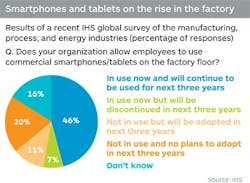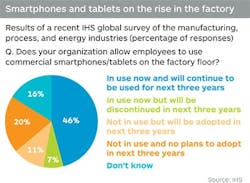According to IHS Technology analysts Toby Colquhoun and Tom Moore, manufacturing workers are jumping on the bring-your-own-device (BYOD) bandwagon, thus reshaping information technology in both business offices and the manufacturing sector, with employee-owned smartphones and tablet PCs playing an increasingly important role in factory settings.
Wireless network connections in global factories are projected to rise from 2.1 million in 2012 to 3.4 million by 2017, report Colquhoun and Moore. Helping enable the rise of BYOD are the growing use of wireless networks and industrial Ethernet in factories and the networking of industrial automation equipment using standard wireless networking technologies such as Wi-Fi or Bluetooth.
More than half of all organizations surveyed recently by IHS Technology allow their employees to use a personal wireless communications device on the factory floor now or plan to allow it within three years. To support the use of such devices in manufacturing, industrial automation vendors are developing applications that operate on iOS and Android devices.
But all is not roses with BYOD. Despite its usefulness in manufacturing, BYOD presents a range of challenges. Unlike industrial PCs, consumer mobile devices are not designed to endure the stresses commonly encountered in manufacturing, such as vibration, heat, water and electrical interference. Moreover, the limited battery life of personal communications presents problems, such as the need to recharge a device mid-shift.
Security also remains an issue. Integration of smartphones and tablets into the company network adds a potential new point of vulnerability for hackers to exploit. Furthermore, smartphones or tablets that contain sensitive company data and are lost or misplaced could fall into the wrong hands, and employees who resign or retire may retain company information on their devices either accidentally or on purpose.
Company policies on the use of BYOD vary and are still very much a work in process, and, despite the hype about the usefulness of smart devices on the factory floor, a significant number of companies remain unconvinced that the risks and complications surrounding their use are worth the reward.
According to the IHS Technology survey, 46% of manufacturers surveyed allow BYOD in their plants and plan to continue to allow it for at least three years, and another 11% plan to adopt its use with three years. However, 20% of those surveyed don't allow it now and have no plans to do so within that three-year window, and another 7% allow BYOD now, but are planning to discontinue its use. Indicative of the newness of the BYOD phenomenon and the uncertainly surrounding its use in manufacturing, fully 16% of those surveyed don't know what their company's policy is or what its plans for either allowing or forbidding it in the future.


